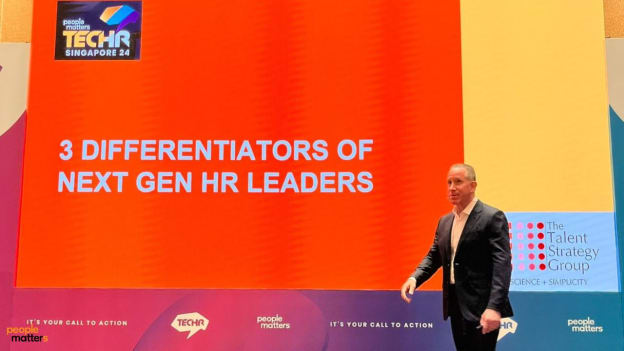Talent expert Marc Effron on what makes great HR leaders

Which three factors distinguish remarkable HR leaders?
Marc Effron, the world-renowned talent expert and author, opened his speech at TechHR Singapore 2024 with this question. His presentation on ‘HR in Action’ offered practical advice on modern leadership.
“If you want to differentiate yourself in your field, it starts by having a high performer’s mindset. That means three things,” Marc told a packed audience.
“First, high performers tend to work more than others. Now, that should not be a controversial statement,” he said. “People who put in more hours tend to position themselves for higher performance. Those who have a high-performance mindset recognise they might need to sacrifice some time – which they would like to be doing other things – to spend time at work because they’re willing to invest that. They don’t always do that, but they make the choice sometimes to do that.”
No matter what’s at stake or how tough the competition is, they are committed to giving their best.
“Unless we have that high performer’s mindset, we don’t have the foundation to do the other things that I’m talking about,” Marc said.
“We asked this question in our most recent research: ‘Are you willing to sacrifice some areas of your life in order to be successful in your career?’ About 40% of people said, ‘No, I am not,’ and that’s up 8% from our last survey in 2019.
“That’s an OK choice if you want to make it. There’s nothing wrong with that. But it also says, you might not be positioning yourself to be a high performer,” he explained.
1) Great HR leaders know and love the business
Marc encouraged his audience to see the business from the CEO’s point of view.
“What we should be thinking about in terms of focus on our day-to-day activities is, ‘What does the CEO need to get done this year?’ And then, ‘What am I going to do because of that?’ It should be as easy as, ‘Hey, Mr. CEO, Ms. CEO, because you are trying to do this, I am going to do that.’”
Marc calls this scenario the “elevator speech” for when “the CEO catches you in the elevator and says, ‘What are you working on right now?’”
His advice: “Don’t say things like, ‘Oh, we bought some new technology. That’s fun,’ or, ‘There's best practice stuff we’re doing,’ or ‘We have some money left over from the budget, so we’re spending it on this.’”
Instead, great leaders connect their own pursuits to the CEO’s own mission. “You say, ‘Because you are trying to achieve this, I am focused on that,’” Marc said. “That’s an easier conversation to have if we care about the company’s success – if we care about our company being financially successful.”
The talent expert recommended a self-assessment to the audience based on two questions:
- Do I understand the business as well as my CEO or CFO?
- Do I truly love the business I am in?
“If you don’t love the business you’re in, you’re not passionate and excited and engaged by the business you’re in, then it’s going to be very difficult for you to align what you’re trying to do,” Marc said.
2) Great HR leaders build strong relationships and influence others well
In Marc’s book, 8 Steps to High Performance, findings showed the importance of building positive relationships in the workplace.
“Your relationship with your boss is the single most important relationship you have at work,” he said. “It may surprise you to also hear that bosses are people. They’re people just like us. They like interacting with people. They like having conversations with people. They like being asked about how their weekend was – like other people.”
After building rapport with your boss, make sure to establish harmony with your co-workers. “Your peers are the second place to focus. They cannot get you promoted, but they can stop you from getting promoted,” Marc said.
“Get five or 10 or 15 people who are going to say good things about you and who are going to support you when you go to ask other people for cash, for investments, and for their time.”
3) Great HR leaders build talent faster
Lastly, Marc challenged his audience to be better talent builders.
“Now, I know not all of you are in HR, but even if you’re not, people who build better talent faster are [more] valuable in the organisation. I will pay more for people who do this than for people who don’t do this because they are adding to the positive investment that I’m making in the company,” he said, referencing his signature framework called the ‘talent production line’.
For Marc, success cannot rely solely on the ability of talent who will do the job. Employers need to develop talent who will become MVPs in their own right and bring something special to the organisation.
“You certainly want to build good corporate citizens. That’s fine, but what you really want is more of the few valuable elements that are going to differentiate success in your company going forward,” he said.
















